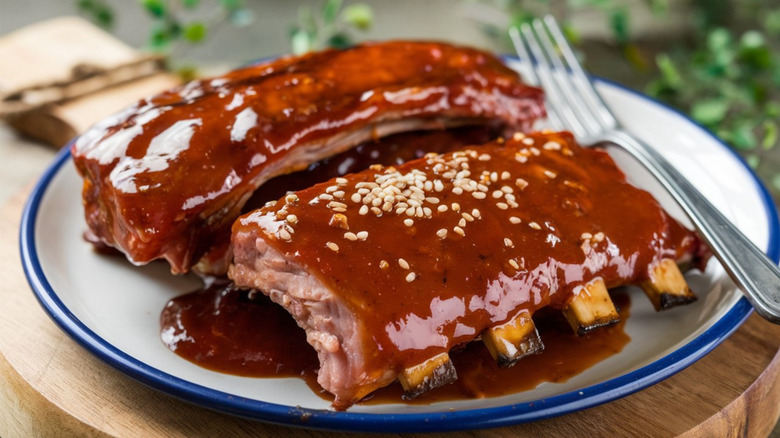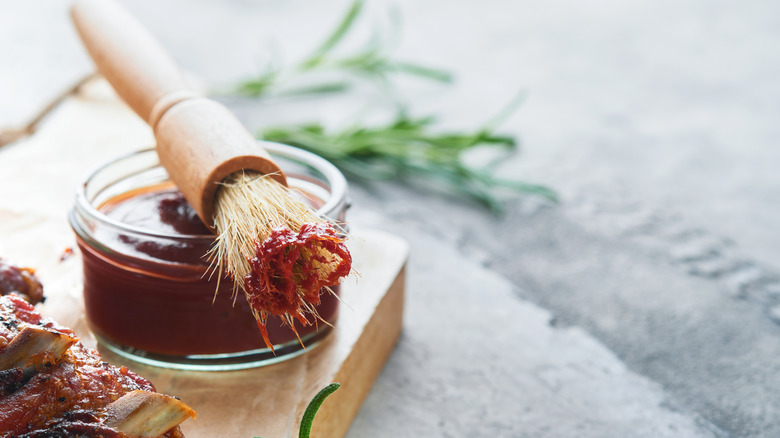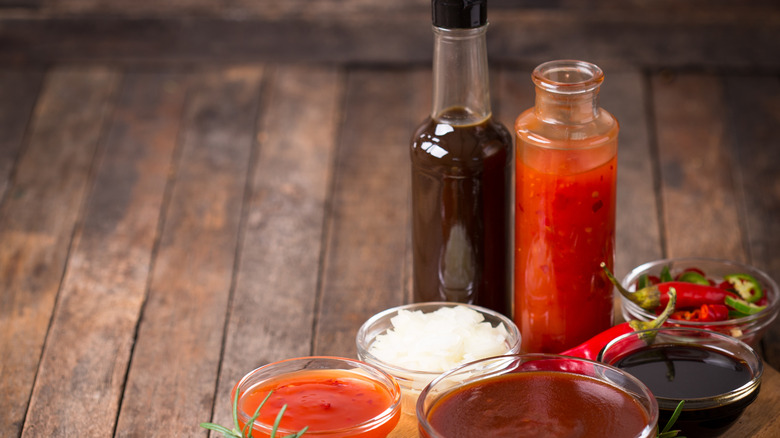The Perfect Homemade Barbecue Sauce Is All About Customization
One of the best things about barbecue is that it's so easy, both to make and to make your own. It's meat + heat + spice + time. Within that basic formula are endless opportunities for flavor, whether it's trying a new protein (alligator or tofu, anyone?), experimenting with smoking equipment, trying a new rub, or, our favorite method, customizing your barbecue sauce.
Celebrity chef Robbie Shoults is an expert on the subject. Shoults, who has appeared on programs like the "Rachael Ray" talk show and served as a five-time guest judge on The Food Network's "Beat Bobby Flay," is the third-generation owner of Bear Creek Smokehouse in Marshall, Texas, where he sells a range of smoked meats and barbecue seasoning essentials, including the Bear Rubz Grillin' Spices. He's also the owner of Marshall Mercantile and High Horse 1898. Shoults was kind enough to speak exclusively with Chowhound and offer his suggestions for tailoring your barbecue sauce to your taste and mood, recommending a range of sweet, smoky, spicy, tangy, and umami-rich ingredient combinations.
Making the perfect barbecue sauce at home
Of course, homemade barbecue sauce offers the best opportunity to achieve a sauce that's perfectly suited to you and your dish. "There are many combinations of barbecue sauce styles, including sweet, tangy, smoky, hot — the list goes on and on," Robbie Shoults says. "Get creative, but the basic ingredients are tomato sauce, ketchup, apple cider vinegar, molasses, brown sugar, honey, yellow mustard, liquid smoke, Worcestershire sauce, and your favorite spices."
Shoults' specialty is Texas-style barbecue, which is known for its smoky, spicy, tomato-based flavor, so he typically starts with a base of tomato sauce or ketchup on the stovetop, also commonly used for Kansas City's thick, sweet sauce. But there are numerous regional styles of barbecue sauce across the U.S., each with its own flavor profile, from the mayonnaise-based Alabama white sauce to Memphis-style sauce's emphasis on vinegar and mustard. Depending on where you're from and what kind of protein you're using, you might opt to start with a base of tomato sauce or ketchup, mustard, or apple cider vinegar, then add the spices, sweetener of choice, or smoke additive as desired to give your sauce a sweeter or smokier flavor profile.
Unexpected ingredients to make your sauce stand out
To give homemade barbecue sauce a little extra sweetness, Robbie Shoults suggests adding agave instead of the brown sugar, molasses, or honey often used in typical sauces. Agave syrup comes from a plant, meaning it's vegan (unlike honey). It also has a milder, more neutral flavor and is sweeter than sugar, so you need less of it. Maple syrup can also give a sauce a distinctive buttery sweetness with a little bit of smoke.
To add a little South Carolina flavor to your sauce, try yellow or Dijon mustard as well as some hot sauce. Go full-on Texas heat by throwing in some chili powder, cayenne pepper, or chipotles in adobo sauce. Citrus juice can also add freshness to a sauce while thinning its consistency. Minced onion and garlic can provide some extra flavor depth. For an Asian take on barbecue sauce, Shoults says, "I would also like to try soy sauce or teriyaki, along with some red pepper flakes, to create a new twist on traditional flavors."
And if you're not up for making your own sauce from scratch, why not select one of the best barbecue sauces from the grocery store and doctor it? Many bottled sauces can be too thick or too sweet, so, in addition to other spices and condiments of your choosing, consider whisking in a little apple cider vinegar, which adds tartness and thins it out. There are no rules — simply let your taste buds guide you when customizing your barbecue sauce, whether homemade or store-bought.


